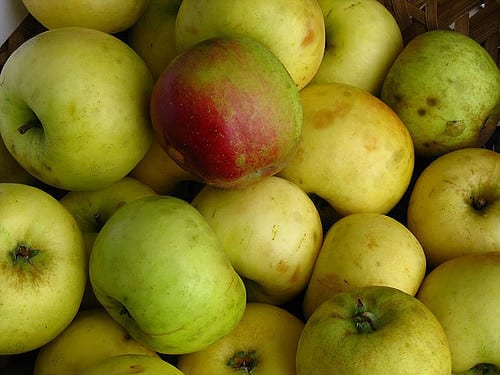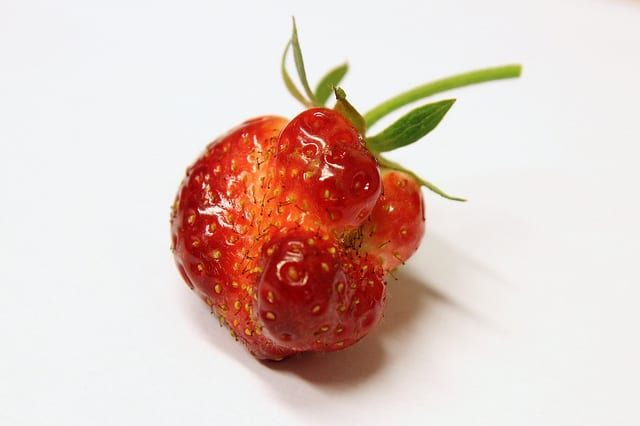
We live in a society that is obsessed with perfection. We expect perfection in our own bodies, faces, jobs and even in our food. We are all guilty of it. Imagine you are in the grocery store faced with the choice of organic or regular apples. Upon closer inspection you find the organic apples are smaller and a bit scarred, paling in comparison to their voluminous, unblemished neighbors. You choose the perfect apple over the ugly one.
But what if I told you the ugly apple has its own secret weapon?
Let's rewind to the beginning. Imagine you have two apple seeds. One is headed for a life in an organic apple orchard while the other is headed for a life in a standard orchard. In the organic orchard, the apple tree will never receive synthetic (man-made) fertilizers or pesticides. While this tree may still receive natural pesticides derived from plant chemicals like Rotenone and Pyrethrin and fertilizers like green manure and compost, overall it faces a much more challenging life than its conventional counterpart. It spends year after year fighting off fungal and insect attacks and nutrient deficiency while a farmer provides the standard tree with more nutrients than it could ever need and eliminates any insect before it can land on its branches.

But why does it matter if some plants have a harder life than others?
When a plant is stressed by a short supply of nutrients or an attack by pests or disease, it increases antioxidant production as a form of defense. The hard work and daily struggle of this little apple translates to more nutrition for us down the line! Having lived a life of luxury without experiencing the same levels of environmental stress, the standard apples end up having a lower antioxidant capacity. Studies have demonstrated this higher antioxidant concentration in a number of organic crops including apples, cucumber, melons, tomatoes, corn and strawberries. A meta-analysis of 343 different studies also concluded that organic produce exhibits 20-40% higher antioxidant content than the conventionally grown counterparts.
Why should you care about the antioxidants in your food?
The cells in your body are all held together by chemical bonds. When your body is stressed by factors like poor diet, pollution, aging and radiation, an electron can be knocked out of one of these chemical bonds. This produces a free radical, which is essentially a normal molecule in your body that is hungry to find an electron to replace the one it has lost. It will snatch electrons from other healthy molecules, and turn them into free radicals as well. Interestingly, the presence of some free radicals plays a beneficial role in cellular functions like cell signaling. However, it is a delicate balance and an excess of free radicals creates a vicious chain reaction that damages lipids, proteins and even molecules of your DNA. This is commonly referred to as oxidative stress, which is believed to play a role in aging and several diseases like Alzheimer's, heart disease and cancer.
This is where antioxidants come in to save the day! Antioxidants charge onto the scene equipped with an arsenal of extra electrons that they can deliver to the plagued free radicals without becoming free radicals themselves. Studies have shown that diets high in antioxidants have been correlated with increased cognitive abilities, reduced risk of Type 2 diabetes and prevention and treatment of Alzheimer's.
What does it all mean?
These studies have striking significance as consumer's cosmetic expectations become more and more unrealistic. Any spot, scar or deformity makes massive quantities of produce unmarketable. Each year about 6 billion pounds of food are either left in the field to rot or are discarded somewhere else down the line, often just because they are too ugly. This means that a huge amount of edible food is being wasted that may in fact pack an extra nutritional punch! With the human population expected to reach 9.7 billion by the year 2050, any amount of edible food wasted is too much.
So next time you find yourself in the grocery faced with the choice of a beautiful or blemished apple, give the ugly apple a chance. As the old saying goes, beauty is in the eye of the beholder, and it might be about time we saw the beauty in ugly food.
 Hayley Schroeder is an undergraduate at UGA studying Ecology and Entomology. She is an enthusiastic foodie, advocating for food that nourishes not just the people eating it, but communities, farmers and the earth as well. She is also a friend to all insects and can be easily spotted on campus by her butterfly net. Contact her at hayleyadair37@uga.edu. More from Hayley Schroeder. Hayley Schroeder is an undergraduate at UGA studying Ecology and Entomology. She is an enthusiastic foodie, advocating for food that nourishes not just the people eating it, but communities, farmers and the earth as well. She is also a friend to all insects and can be easily spotted on campus by her butterfly net. Contact her at hayleyadair37@uga.edu. More from Hayley Schroeder. |
About the Author
- athenssciencecafehttps://athensscienceobserver.com/author/athenssciencecafe/April 17, 2020
- athenssciencecafehttps://athensscienceobserver.com/author/athenssciencecafe/April 12, 2020
- athenssciencecafehttps://athensscienceobserver.com/author/athenssciencecafe/April 3, 2020
- athenssciencecafehttps://athensscienceobserver.com/author/athenssciencecafe/March 30, 2020







